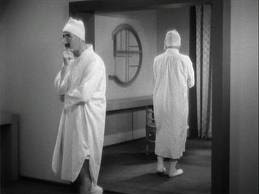L'Atalante
I have this
gap I need to fill between movies I have seen and movies I have reviewed. This
gap is now down to 26 films (not counting all those modern films I have not
even gotten to yet) and I am struggling to close it. It has been about a year and
a half since I saw them so I need to see them again in order to write some
decent comments. Otherwise it just becomes some bland “yeah, I liked this” or
“no, this one sucked” comments. Usually these reruns are fun since most of the
films are good, but there are also those of them that I did not like very much
and I dread having to see them again. “L’Atalante” is one of those.
L’Atalante
belongs to my download collection and when I travel it is easier to just watch
movies from the harddisk and this one is, well, next in line. I actually bought
it on DVD back then, but directly from France and it turned out that the
subtitles included were only in French and Italian. Now, I do not speak either
so I had to find a download with subtitles I could read and after all that work
the film left me rather disappointed.
With those
much reduced expectation it may be no wonder that I liked it better second
round. Not the movie or story itself, mind you, that is still somewhere between
incomprehensible and lame, but some of the characters are very interesting and
there are a number of redeeming elements, which I will shortly get back to. If
I should sum up the reasons to watch L’Atalante it is a single name: Michel
Simon.
The two
leads, Jean (Jean Dasté) and Juliette (Dita Parlo) generally annoy me. The
story is briefly that they get married and immediately set off on Jean’s barge.
When they get to Paris they have a fallout, get separated and then reunited.
That is about it. Juliette obviously married Jean as a ticket out of her
village to see the world. She is naïve and it is hinted at that she was lured
into the marriage by grand promises from Jean. When finally she gets to Paris
she is easy prey for the vultures lurking there and seems even to actively seek
them out. Jean is a very jealous husband. Now that he has won his wife she is
his and his alone and he is prone to violence when he sees his possession being
threatened.
So, we see
these two people madly in love, then shouting at each other, then having
passionate sex, then some more shouting and so on and on. It basically makes me
resign and think “whatever”, which is a problem since their relationship is the
core of the story.
Instead I
found myself enjoying Michel Simon as the rough old sailor Pere Jules. Simon is
always a pleasure to watch and this is the best performance I have seen from
him. He is grimy and crude and frankly rather disgusting, but gradually we (and
Juliette) see sides of him that are both tender and interesting. In his cabin
on the boat he has and builds all sorts of paraphernalia and keep countless
(and adorable) cats. He at least is very convincing and stays in character
throughout. Everything he does is consistent with Pere Jules, tough on the
outside, soft on the inside and lonely all over, yet self-reliant.
I also
liked the set on the boat. It is always interesting to confine a small group of
people in limited space and see what happens. I would say some 70% of the film
takes place on the barge and truly there is something romantic about drifting
along on the canals from dock to duck.
The most
annoying character however is the idiot they meet at the dancehall (Gilles
Margaritis). At first I was annoyed with Jean for getting provoked by him but
soon I felt like punching his face as well and be cross with Juliette for not
seeing him for the scum he is. Sic.
Finally you
may notice that they serve Moules et Frittes at the dancehall. That is just
delicious and I can recommend that to anybody. The movie however only if you
are a diehard Michel Simon fan.
----------------------------------------------
On an entirely
different note I am now in Tokyo, Japan, and man, I feel watching Lost in
Translation again. So, watch out for that review coming up soon. There may be
some location shots included.







